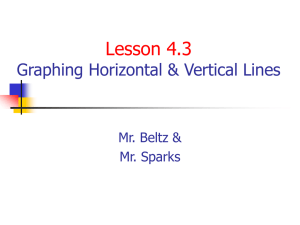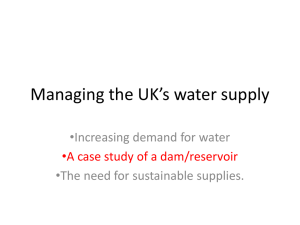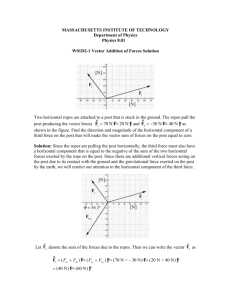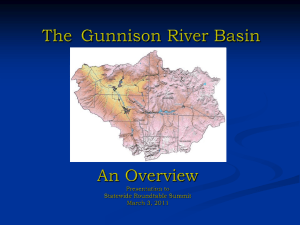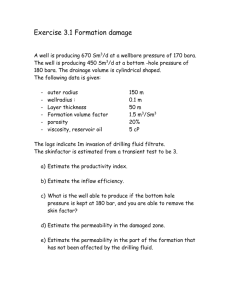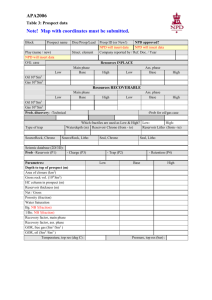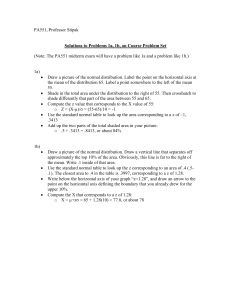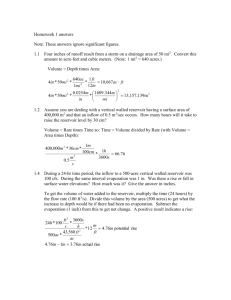Task 4.5 Horizontal and vertical well in anisotropic reservoir
advertisement
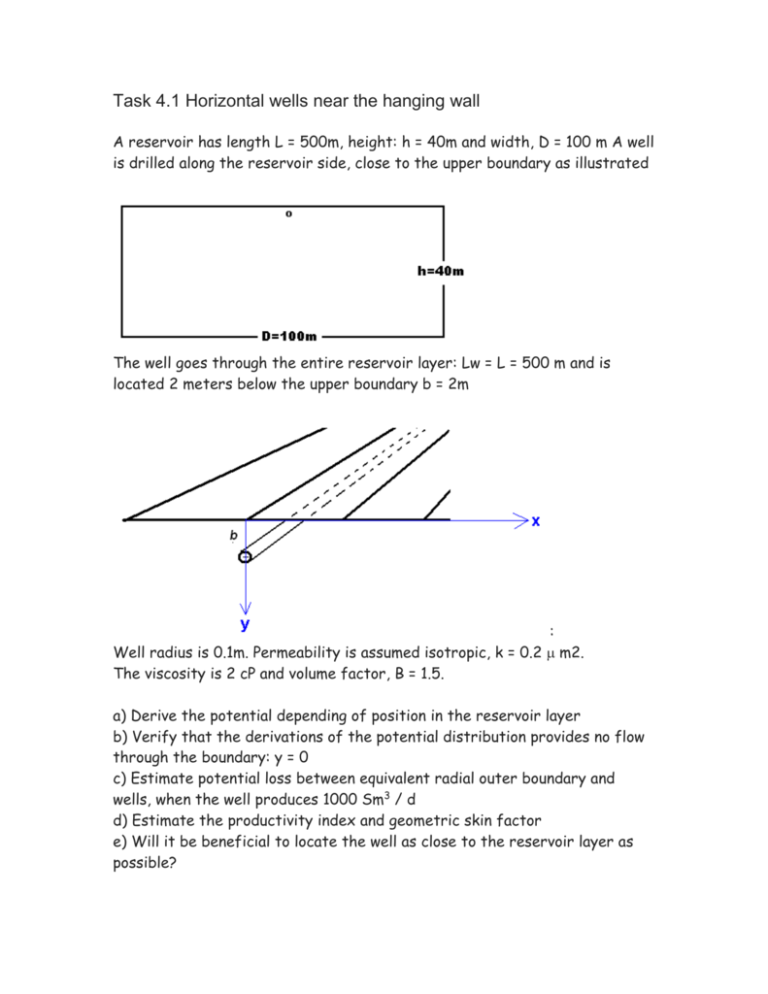
Task 4.1 Horizontal wells near the hanging wall A reservoir has length L = 500m, height: h = 40m and width, D = 100 m A well is drilled along the reservoir side, close to the upper boundary as illustrated The well goes through the entire reservoir layer: Lw = L = 500 m and is located 2 meters below the upper boundary b = 2m : Well radius is 0.1m. Permeability is assumed isotropic, k = 0.2 m2. The viscosity is 2 cP and volume factor, B = 1.5. a) Derive the potential depending of position in the reservoir layer b) Verify that the derivations of the potential distribution provides no flow through the boundary: y = 0 c) Estimate potential loss between equivalent radial outer boundary and wells, when the well produces 1000 Sm3 / d d) Estimate the productivity index and geometric skin factor e) Will it be beneficial to locate the well as close to the reservoir layer as possible? Task 4.2 Comparison, “long horizontal” and vertical well A reservoir layer is of length 2000m, width 500m, thickness 10m. Rock and fluid data as follows: - Viscosity, reservoir oil: permeability: formation volume factor: wellradius: reservoir pressure: expected skinfactor: 5 cP 200 md (1D = 0.987m2) 1.5 m3/Sm3 0.1 m 200 bar 2 We assume that the skin factor is the same no matter if the well is horizontal or vertical. a) Based on the formula for a ”Long Horizontal Well”; What is the required length for such a well if it is supposed to have the same productivity index as for a vertical well? Alternative well strategies are considered: Either 4 vertical wells, each draining an area of 500x500m. Or 1 horizontal well, completed length of 500m. b) Compare expected production for the horizontal well versus 4 vertical wells, all at wellbore pressure 180 bar c) What is the pressure loss due to skin for the vertical wells? d) If the horizontal well is producing the same amount of fluid as the 4 vertical wells, what is the pressure loss due to skin for this well? Task 4.3 Comparison, “short horizontal” and vertical well A reservoir layer is of length 2000m, width 500m, thickness 10m. Rock and fluid data as follows: - Viscosity, reservoir oil: permeability: formation volume factor: wellbore radius: reservoir pressure: expected skin factor: 5 cP 0.1 m 200 md (1D = 0.987m2) 1.5 m3/Sm3 200 bara 2 We assume that the skin factor is the same no matter if the well is horizontal or vertical. We have previously, in exercise 4.1, estimated that a 120 m long horizontal well is necessary to achieve the same productivity as for a vertical well. This estimate was based on the formula for a long horizontal well. a) Based on the formula for a ”Shorter Horizontal Well”, what is the required length to achieve the same productivity as for a vertical well? b) Evaluate the estimates based on the formulas for a ”Long” and ”Shorter” well. Are the results reasonable? Statement: When the well is sufficiently long, the extra estimated productivity per meter length for a shorter well corresponds to the productivity per meter for a long well. c) Confirm or reject the statement above. d) Task 4.4 Well Direction The reservoir is 2000m long, 500m wide and 10 m high. Reservoir and fluid data are as for previous tasks - Viscosity , reservoir oil : Permeability: Formation factor: Well radius: Reservoir pressure: Expected skin factor : 5 cP 200 md ( 1D = 0.987 m2) 1.5 m3/Sm3 0.1 m 200 bar 2 In the previous task , we estimated that 10 m completed horizontal well would provide the same productivity as that of a vertical well . According to the “short well” formula well orientation and reservoir geometry are irrelevant. This should be taken into account in the current task a) Estimate the productivity index if a horizontal well of length: Lw = 10m is oriented along the long reservoir direction : L = 2000m . b ) Estimate the productivity index if the well is oriented along the short reservoir direction: D=500 m Task 4.5 Horizontal and vertical well in anisotropic reservoir In the above task was estimated that a horizontal well with length 10 m would be about as productive as a vertical well through reservoir layer. This assumed equal permeability in horizontal and vertical direction a) How long horizontal well is needed if the ratio between horizontal and vertical permeability is: kH / kV = 16
